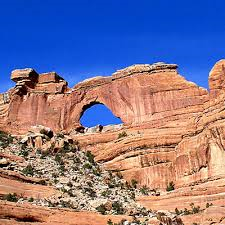
17 September 2014
. Posted in Today At Utah Policy
Gov. Gary Herbert says there will be NO new national monument surrounding the current Canyonlands National Park, at least not soon.
Speaking at his monthly KUED Channel 7 press conference, Herbert said in D.C. discussions last week with U.S. Interior Department Secretary Sally Jewel, she told him that it’s better to follow a legislative solution put forward by Rep. Rob Bishop, R-Utah, or others in Congress.
“In any case, there won’t be a Bill Clinton-type surprise,” Herbert told reporters after his 30-minute televised news conference ended in the KUED studios.
Herbert was referring to 1996, when then-President Clinton told folks he wasn’t planning on naming a new monument in Utah, then went to Arizona and announced the Grand Staircase-Escalante National Monument – which angered Utahns a whole bunch.
President Barack Obama created a small national monument in Arizona several months ago, and then said, “We aren’t finished” naming more such monuments under a 1906 federal law that allows presidents to protect threatened national environmental treasurers.
Many believed that Obama would create a 1.8 million acre monument around the current Canyonlands National Park – as some have advocated.
But Herbert said Jewell told him that the Interior Department doesn’t see that is needed now – as Bishop’s land bill and others moves through the House – and that it would be preferred if the president didn’t have to act on his own.
“I think (the Bishop bill) can be done over the next year,” Herbert, a Republican, said.
Reporters pressed Herbert, asking if Jewel was saying there would be no Clinton-like surprise – that Utah officials would be told ahead of time about any new monuments coming – or if she was saying Obama would NOT create any new monuments in Utah anytime soon.
“A little of both, probably,” the governor said.
But Herbert said several times it was his impression that Jewel was saying Obama would not create a Canyonlands expansion via the national monument route.
“And why not?” Herbert asked rhetorically.
The Bishop bill is more targeting, setting aside 1.5 million acres of federally-owned land in Utah, not 1.8 million, like some are talking about the Canyonlands expansion.
“And we get some wilderness designation lands, as well,” in the Bishop bill, which should satisfy Eastern environmental groups, Herbert said.
Reported Herbert, Jewell said: ““There are no plans to do it, and should not do it.””
But Herbert said such talk should be seen as a parallel track to state Rep. Ken Ivory’s work on getting the federal government to give Utah ALL of the federal lands in the state (not counting national parks, monuments and wilderness areas.)
Ivory, R-South Jordan, and a recognized constitutionalist/states rights advocate, got a law passed several years ago that says if the feds don’t give up all their lands in Utah by the end of this year, Utah may sue over the issue – seeking a U.S. Supreme Court decision ordering the feds to keep their promise at statehood in 1896 to turn over federal lands to the state.
Herbert said Jewel’s statement, as he understood it, still allows for his own personally-preferred route to getting Utah control over vast amounts of federal lands in the state:
-- First state officials negotiate with the feds.
-- Then there is national legislation (like Bishop’s) aimed at gradually turning over parts of federal lands to state control.
-- And as a last resort, litigation, seeking federal court rulings demanding control of some federal lands in Utah.
The Legislature has already set aside $2 million to pay for litigation, including hiring outside lawyers and/or expert witnesses.
When some Utahns screamed that state legislators and/or county officials couldn’t be trusted to properly take care of federal lands – and that lawmakers would sell off valuable lands just to make money – the Legislature created the Commission for the Stewardship of Public Lands, which started meeting this summer. Ivory is a co-chair.
The commission’s charge is to draft legislation and regulations that state and local officials would follow should Congress or the courts give Utah control of much of the federal land in the state.
Utah is a public lands state now, with more than 60 percent of the land being controlled by the feds in some form or another.
And it would remain a public lands state if Utah gets control of all federal lands – the public lands would just be controlled by state and/or county officials.
While it is great that America is becoming oil and natural gas self-sufficient, almost all of that development is happening on private land, said Herbert.
Utah has considerable natural resources, but most are on federal lands – and feds have been slowing down such development, not accelerating it, he added.
Herbert said new methods of oil and gas exploration make it perfectly possible to develop that energy while still being sensitive to the environment.
Bottom line, said Herbert, he was told last week there were no plans for a new monument in Utah, and that Congress should be allowed to work on bills that would turn over some federal lands in Utah, while protecting other environmentally-sensitive lands, like wilderness.